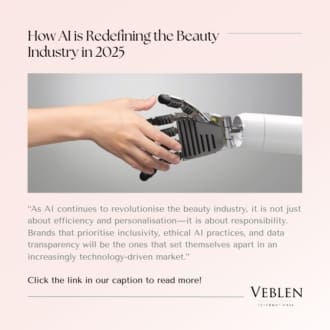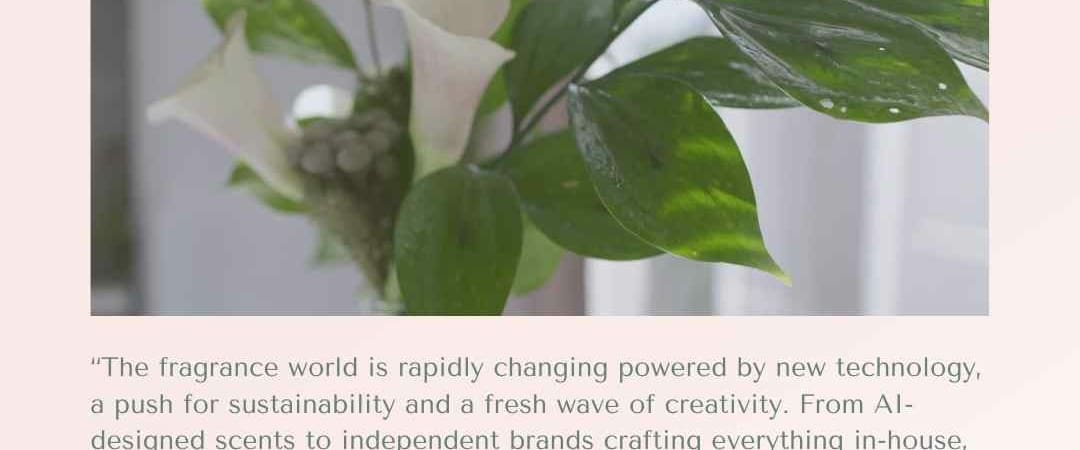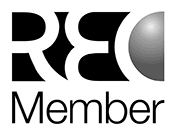The global fragrance market continues to grow steadily, projected to reach €56.44 billion (approximately USD $60 billion) by mid-2025, with some estimates placing its broader value at $52.4 billion. While growth rates vary by source, the common thread is clear: innovation is driving this expansion. From multinational corporations to independent artisan houses, fragrance creators are embracing technology, sustainability, and consumer-led trends to reshape how scent is developed, produced, and experienced.
Beyond Tradition: Technology and Sustainability
AI-powered perfume creation is no longer niche. Start-ups such as Osmo can digitise scents and deliver custom perfumes in as little as 48 hours, while fragrance giants including DSM-Firmenich, Givaudan, IFF, and Symrise use advanced tools like Givaudan’s Carto and DSM-Firmenich’s EmotiON to accelerate formulation. While AI offers speed and personalisation, some industry voices caution it could diminish craftsmanship unless ethical standards are maintained.
Givaudan is also advancing digital storytelling and emotion mapping. At VivaTech 2025, it unveiled “story-smelling,” an immersive experience linking scent to personal narratives, a sign of how fragrance discovery is evolving in the digital age.
Market Trends and Consumer Demand
Gen Z is now a major driver of fragrance sales. In 2025, prestige fragrance sales rose 8% year-on-year, outpacing skincare and make-up. Rising interest in “status scents” and the sampling economy, where consumers test trends via smaller, lower-risk purchases, is opening new marketing channels.
Fragrance formats and scent profiles are diversifying, with gourmand notes expanding beyond vanilla into teas, spices, nuts, and boozy accents. There’s a resurgence of florals, aldehydic “sparkling” scents, and juicy fruit accords, as well as “neo-gourmands” such as popcorn-inspired blends and sheer, natural interpretations of musk and oud.
Skinification – fragrances designed to integrate seamlessly with skincare routines is gaining traction, alongside strong demand for transparency and sustainability. The organic fragrance market now exceeds $7.5 billion, while refillable packaging is fuelling luxury segment growth of over 12%.
Scientific and Sustainable Innovations
Sustainability is also driving scientific breakthroughs. Researchers at the University of Edinburgh are exploring ways to transform “fatbergs” (hardened sewer waste) into pine-scented fragrances using engineered bacteria. Advances like femtosecond thermal lens spectroscopy promise faster, more precise scent analysis, while machine learning models are predicting odour profiles and generating new scent molecules with remarkable accuracy.
Brand Moves and Market Highlights
Unilever’s £80 million investment in a new fragrance hub at Port Sunlight in the UK is a prime example of innovation at scale. The 21,000m² facility will unite scientists, fragrance experts, and product developers, integrating AI, robotics, and real-time analytics to accelerate creation for brands including Dove, Lynx, and Sure. By centralising operations, Unilever is reducing supply chain risks, improving sustainability, and speeding up product development.
Global competitors are also raising their game. Estée Lauder recently opened a dedicated fragrance innovation centre in Paris, boosting R&D for brands such as Jo Malone London, Le Labo, and Tom Ford Beauty. Fueguia 1833, meanwhile, represents the opposite end of the spectrum, a fully vertically integrated independent house crafting every element of its fragrances in-house for complete creative control.
Coty is targeting Gen Z with agile product formats such as body mists and pen sprays, while indie favourite Phlur, backed by TSG Consumer Partners, continues its emotionally driven fragrance storytelling and global expansion. Celebrity-backed launches, such as Bella Hadid’s alcohol-free Ôrebella, are also adding fresh energy to the market.
The Bigger Picture
From AI-driven formulation to sustainable upcycling, from heritage giants to niche disruptors, innovation in fragrance is shaping the future of the industry. Brands that balance technology, creativity, and ethical practice are set to capture the attention and loyalty of the next generation of fragrance lovers.
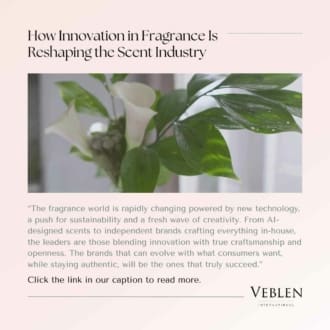
How Innovation in Fragrance Is Reshaping the Scent Industry
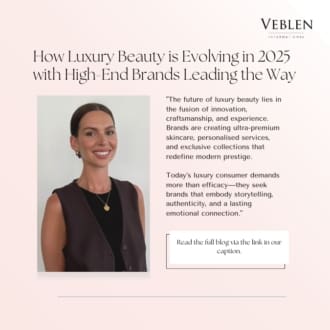
How Luxury Beauty is Evolving in 2025 with High-End Brands Leading the Way
